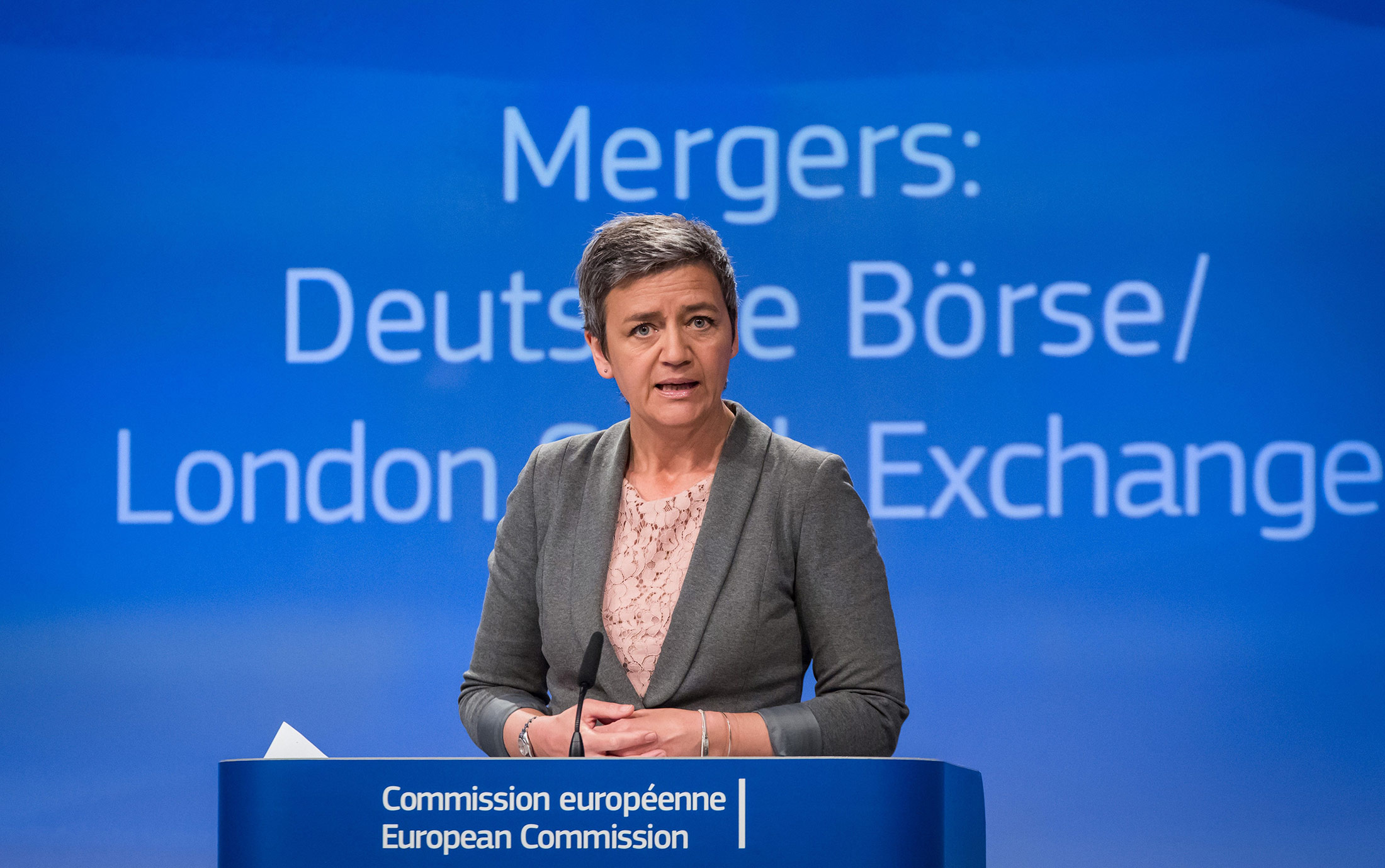March, 29, 2017

Bloomberg - European Union regulators dealt a final blow to Deutsche Boerse AG’s planned takeover of London Stock Exchange Group Plc, a symbolic block on EU-U.K. integration on the same day Britain formally serves notice of its decision to quit the EU.
The $14 billion deal to create Europe’s biggest exchange would have harmed competition in the soon-to-be 27-nation EU by creating a de facto monopoly for clearing bonds and repurchase agreements, the European Commission said in an emailed statement Wednesday. The decision, flagged last month by LSE, thwarts Deutsche Boerse’s expansion just five years after the EU also banned a proposed tie-up with NYSE Euronext.
“The commission cannot allow the creation of monopolies and that is what would have happened in this case," Margrethe Vestager, the EU’s antitrust commissioner, told reporters in Brussels. LSE was “not prepared" to sell a small unit that would have removed concerns that the combined firm could have weakened rival Euronext NV.
EU regulators have become increasingly tough on big deals, demanding weighty concessions to eliminate overlapping businesses amid concerns that a combined firm could dominate an industry and increase prices. While this is the second time that Vestager has formally blocked a merger, several transactions have been ditched over antitrust opposition.
Deutsche Boerse confirmed the deal’s collapse shortly after the decision. When the exchange receives the formal notice, the merger agreement “will automatically terminate,” the German company said in a statement.
“The prohibition is a setback for Europe, the Capital Markets Union and the bridge between continental Europe and Great Britain,” Deutsche Boerse Chairman Joachim Faber said in an emailed statement. “A rare opportunity to create a global market infrastructure provider based in Europe and to strengthen the global competitiveness of Europe’s financial markets has been missed.”
Opposition to the Frankfurt-based exchange’s merger plans went up a gear after the U.K. voted to leave the EU last year. German concerns over moving the combined firm’s headquarters to London added to political riptides over clearing euro trades outside the euro area.
LSE signaled last month that it didn’t expect to win EU antitrust approval, saying the European Commission’s demand that it sell its MTS unit, a trading platform in Italy for government bonds, was impossible.
Failing to sell MTS was crucial because it undermined the viability of LSE’s offer to sell its French clearing unit, the EU said. While the companies offered so-called "behavioral measures" to change their future business behavior, that wouldn’t have eliminated concerns that the firm could have diverted trading feeds that Euronext relies on to its own business.
Regulators said a monopoly for clearing fixed income instruments would have had a knock-on effect on settlement, custody and collateral management. They also said the deal would have removed competition for trading and clearing single stock equity derivatives for Belgian, Dutch and French companies.
"It is the responsibility of the parties to address competition concerns either by rebutting them or by proposing adequate remedies," the EU said in the statement. “To be effective, remedies have to address all of the commission’s competition concerns and be viable long-term."
While LSE cited impossible regulatory demands, half a dozen people familiar with the discussions say that obscured other hurdles. These include a stalemate over the location of the headquarters, which was magnified by the Brexit vote. That decision exposed key parts of the business, like euro clearing, to political forces, said the people who asked not to be named because the talks are private.
Neither Brexit nor the ECB’s concerns over clearing outside the euro zone influenced the EU’s antitrust investigation, Vestager told reporters.
Wednesday’s formal veto means LSE probably won’t follow through on the sale of its French clearinghouse, which it had offered to sell to win over regulators, people familiar with the matter said this week. Euronext NV still wants to acquire the unit.
Deutsche Boerse and LSE "are going to try to find another merger opportunity -- there’s two, possibly three, suitors left,” said Steve Grob, global director of group strategy at Fidessa Group Plc. Those suitors are likely Intercontinental Exchange Inc., CME Group Inc. and Hong Kong Exchanges & Clearing Limited.
“With all the politicization that has come, and with the Brexit agenda, I think it’s going to be hard,” Grob said.
The EU block on a U.K.-German exchange transaction comes a year after Vestager stopped the merger plans of two U.K. mobile phone operators.
Deutsche Boerse’s last attempt to merge with another exchange, NYSE Euronext, fell by the wayside after regulators said it would have created a quasi-monopoly for European financial derivatives traded globally on exchanges.
Video Story